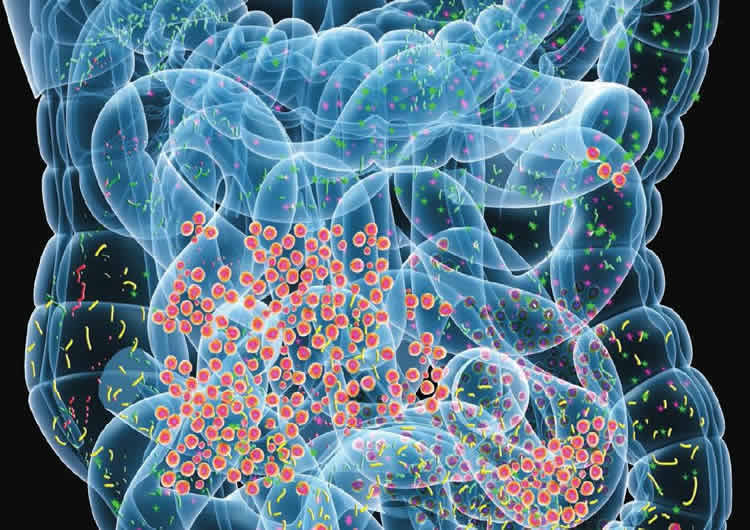Summary: A new study reaffirms the link between intestinal bacteria and altered gut and brain function.
Source: McMaster University.
Finding may lead to new microbiota-directed therapies for gastrointestinal upset and brain disorders.
Research from McMaster University has found that bacteria in the gut impacts both intestinal and behavioural symptoms in patients suffering from irritable bowel syndrome (IBS), a finding which could lead to new microbiota-directed treatments.
The new study, published today in Science Translational Medicine, was led by researchers from the Farncombe Family Digestive Health Research Institute at McMaster, in collaboration with researchers from the University of Waterloo.
IBS is the most common gastrointestinal disorder in the world. It affects the large intestine and patients suffer from abdominal pain and altered bowel habits like diarrhea and constipation, which are often accompanied by chronic anxiety or depression. Current treatments aimed at improving symptoms have limited effectiveness because the underlying causes are unknown.
The goal of the study was to explore whether fecal microbiota from human IBS patients with diarrhea has the ability to influence gut and brain function in recipient mice. Using fecal transplants, researchers transferred microbiota from IBS patients with or without anxiety into germ-free mice. The mice went on to develop changes both in intestinal function and behavior reminiscent of the donor IBS patients, compared to mice that were transplanted with microbiota from healthy individuals.
The researchers found that aspects of the illness that were impacted through fecal transplants included gastrointestinal transit (the time it takes for food to leave the stomach and travel through the intestine); intestinal barrier dysfunction; low grade inflammation; and anxiety-like behaviour.
“This is a landmark study because it moves the field beyond a simple association, and towards evidence that changes in the microbiota impact both intestinal and behavioral responses in IBS,” said Giada De Palma, the study’s first author and research associate with the Farncombe Family Digestive Health Research Institute.
“Our findings provide the basis for developing therapies aimed at the intestinal microbiota, and for finding biomarkers for the diagnosis of IBS,” said Premysl Bercik, the study’s senior author, associate professor of medicine at McMaster and a gastroenterologist with Hamilton Health Sciences.

The authors conclude that their findings raise the possibility that “microbiota-directed therapies, including pre- or probiotic treatment, may be beneficial in treating not only intestinal symptoms but also components of the behavioural manifestations of IBS.”
Interestingly, the authors noted that since the study showed that microbiota in the gut can influence the brain, it “adds to evidence suggesting that the intestinal microbiota may play some role in the spectrum of brain disorders ranging from mood or anxiety to other problems that may include autism, Parkinson’s disease and multiple sclerosis.” However, they added that further work is required to better define the relationship in these conditions.
Funding: This study was supported by grants from CIHR and Nestle Switzerland.
Source: Veronica McGuire – McMaster University
Image Source: NeuroscienceNews.com image is for illustrative purposes only.
Original Research: Abstract for “Transplantation of fecal microbiota from patients with irritable bowel syndrome alters gut function and behavior in recipient mice” by Giada De Palma, Michael D. J. Lynch, Jun Lu, Vi T. Dang, Yikang Deng, Jennifer Jury, Genevieve Umeh, Pedro M. Miranda, Marc Pigrau Pastor, Sacha Sidani, Maria Ines Pinto-Sanchez, Vivek Philip, Peter G. McLean, Moreno-Gabriel Hagelsieb, Michael G. Surette, Gabriela E. Bergonzelli, Elena F. Verdu, Philip Britz-McKibbin, Josh D. Neufeld, Stephen M. Collins and Premysl Bercik in Science Translational Medicine. Published online March 2 2027 doi:10.1126/scitranslmed.aaf6397
[cbtabs][cbtab title=”MLA”]McMaster University “Intestinal Bacteria Alter Gut and Brain Function.” NeuroscienceNews. NeuroscienceNews, 2 March 2027.
<https://neurosciencenews.com/microbiota-gut-brain-6183/>.[/cbtab][cbtab title=”APA”]McMaster University (2027, March 2). Intestinal Bacteria Alter Gut and Brain Function. NeuroscienceNew. Retrieved March 2, 2027 from https://neurosciencenews.com/microbiota-gut-brain-6183/[/cbtab][cbtab title=”Chicago”]McMaster University “Intestinal Bacteria Alter Gut and Brain Function.” https://neurosciencenews.com/microbiota-gut-brain-6183/ (accessed March 2, 2027).[/cbtab][/cbtabs]
Abstract
Transplantation of fecal microbiota from patients with irritable bowel syndrome alters gut function and behavior in recipient mice?
Irritable bowel syndrome (IBS) is a common disorder characterized by altered gut function and often is accompanied by comorbid anxiety. Although changes in the gut microbiota have been documented, their relevance to the clinical expression of IBS is unknown. To evaluate a functional role for commensal gut bacteria in IBS, we colonized germ-free mice with the fecal microbiota from healthy control individuals or IBS patients with diarrhea (IBS-D), with or without anxiety, and monitored gut function and behavior in the transplanted mice. Microbiota profiles in recipient mice clustered according to the microbiota profiles of the human donors. Mice receiving the IBS-D fecal microbiota showed a taxonomically similar microbial composition to that of mice receiving the healthy control fecal microbiota. However, IBS-D mice showed different serum metabolomic profiles. Mice receiving the IBS-D fecal microbiota, but not the healthy control fecal microbiota, exhibited faster gastrointestinal transit, intestinal barrier dysfunction, innate immune activation, and anxiety-like behavior. These results indicate the potential of the gut microbiota to contribute to both intestinal and behavioral manifestations of IBS-D and suggest the potential value of microbiota-directed therapies in IBS patients.
“Transplantation of fecal microbiota from patients with irritable bowel syndrome alters gut function and behavior in recipient mice” by Giada De Palma, Michael D. J. Lynch, Jun Lu, Vi T. Dang, Yikang Deng, Jennifer Jury, Genevieve Umeh, Pedro M. Miranda, Marc Pigrau Pastor, Sacha Sidani, Maria Ines Pinto-Sanchez, Vivek Philip, Peter G. McLean, Moreno-Gabriel Hagelsieb, Michael G. Surette, Gabriela E. Bergonzelli, Elena F. Verdu, Philip Britz-McKibbin, Josh D. Neufeld, Stephen M. Collins and Premysl Bercik in Science Translational Medicine. Published online March 2 2027 doi:10.1126/scitranslmed.aaf6397







